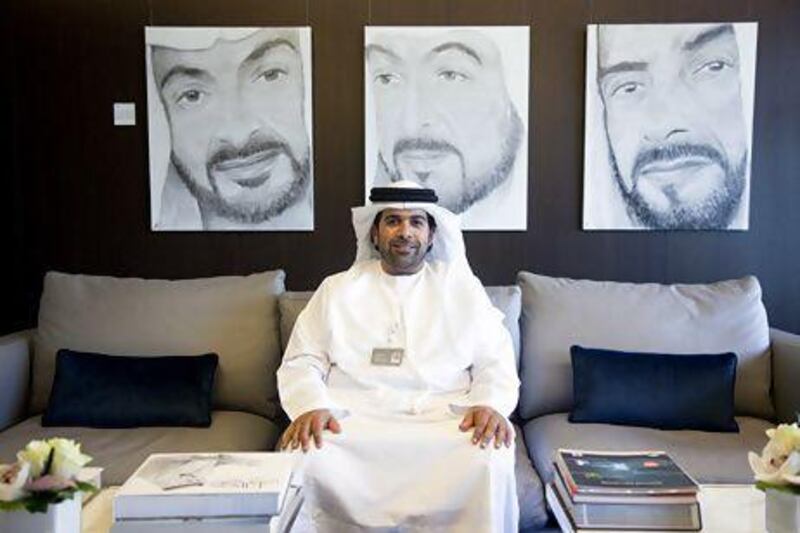For Matar Ali Al Romaithi, the chief officer of the Tawazun Industrial Development Unit, the defence technology being developed in the UAE today is providing the country with the high-tech jobs of tomorrow.
From strategically important Radar systems and patrol aircraft to safeguard the skies above the Arabian Gulf, to satellite technology used for everything from military communications to broadband internet systems, UAE companies are at the forefront.
"For me it is a dream come true, I am living the dream," Mr Al Romaithi says of the organisation he helps to run.
But it is not just the products under development but how those products are developed that is of the upmost importance to Tawazun, Mr Al Romaithi says.
"It is a matter of pride that everything we are developing here involves Emirati nationals in the workforce," he adds.
From scholarship programmes to apprenticeships, engineering masters programmes and on-the-job training, Tawazun exists to equip the Emirati workforce of tomorrow with the most advanced technological skills.
The Tawazun Economic Council was born out of the UAE offset programme, a plan designed to promote partnerships and joint ventures between UAE companies and international contractors with the aim of establishing a home-grown defence manufacturing sector.
"We call it an industrial enabler," Mr Al Romaithi says. "We actually have this terminology in our policy. We look at it as an input mechanism where a defence contractor does not simply invest money in a technology or a project. No, they must train UAE nationals to empower them for the future. This is a requirement of the policy and this is why we have this terminology."
The Advanced Military Maintenance Repair and Overhaul Centre (Ammroc), one of Tawazun's most advanced projects to date, has about 180 Emirati students training to become high-tech aircraft maintenance engineers.
"This is just one good example but there are many more," Mr Al Romaithi says.
Once their training is complete the Emirati engineers will be helping to maintain an aircraft developed through another of Tawazun's programmes.
By the end of next year a swift and stealthy patrol aircraft that started life as an Italian-designed small plane for executive use, will be cruising above the Arabian Gulf for the UAE Air Force.
The special-mission aircraft will be able to fly at an altitude of up to 41,000 feet, with an endurance of 10-plus hours, a maximum range of 6,111 kilometres and a cruising speed of 648 kph.
The plane is being built by Piaggio, the Italian manufacturer part-owned by Mubadala, a strategic investment company owned by the Abu Dhabi Government. Tawazun and Sweden's Saab are also partners in the patrol aircraft programme.
The customer for the project is the Abu Dhabi Autonomous Systems Investments company, which itself is a subsidiary of Tawazun.
The first aircraft to be produced by the partnership is expected to launch next year, by which time a good many of the 180 maintenance engineers being trained at Ammroc will be in place to make sure it is airworthy.
Saab has another venture with Tawazun that was launched just weeks ago to develop a state of the art Radar system for the UAE.
The new company will be named Abu Dhabi Advanced Radar Systems (Adars) and will be 51 per cent owned by Tawazun and 49 per cent owned by Saab.
Mr Al Romaithi says the new venture is a perfect example of how the Tawazun Economic Council fosters relationships with international defence contractors to form partnerships that in turn develop the UAE's own defence industry.
"And with this Adars project there is a commitment from all parties, Tawazun and Saab, to employ 15 engineers from the UAE to start on this project," Mr Al Romaithi says.
As part of the agreement, and to strengthen the UAE's defence capabilities in the development and delivery of advanced radar systems, those 15 UAE nationals will participate in a Masters programme in Microwave and Radar Technology Engineering in Sweden.
Today, some 60 per cent of the workforce under the Tawazun umbrella is composed of Emirati nationals. And there is scope for many more similar partnerships and training programmes that will hopefully increase the proportion of Emirati workers over the coming years.
"We have 93 partner companies right now and we are trying to motivate continuous development of this policy," Mr Al Romaithi says.
"The Government is looking at diversifying the economy away from oil and gas and we have huge potential in the future. I cannot say what proportion of the economy we will be but we have huge potential."





